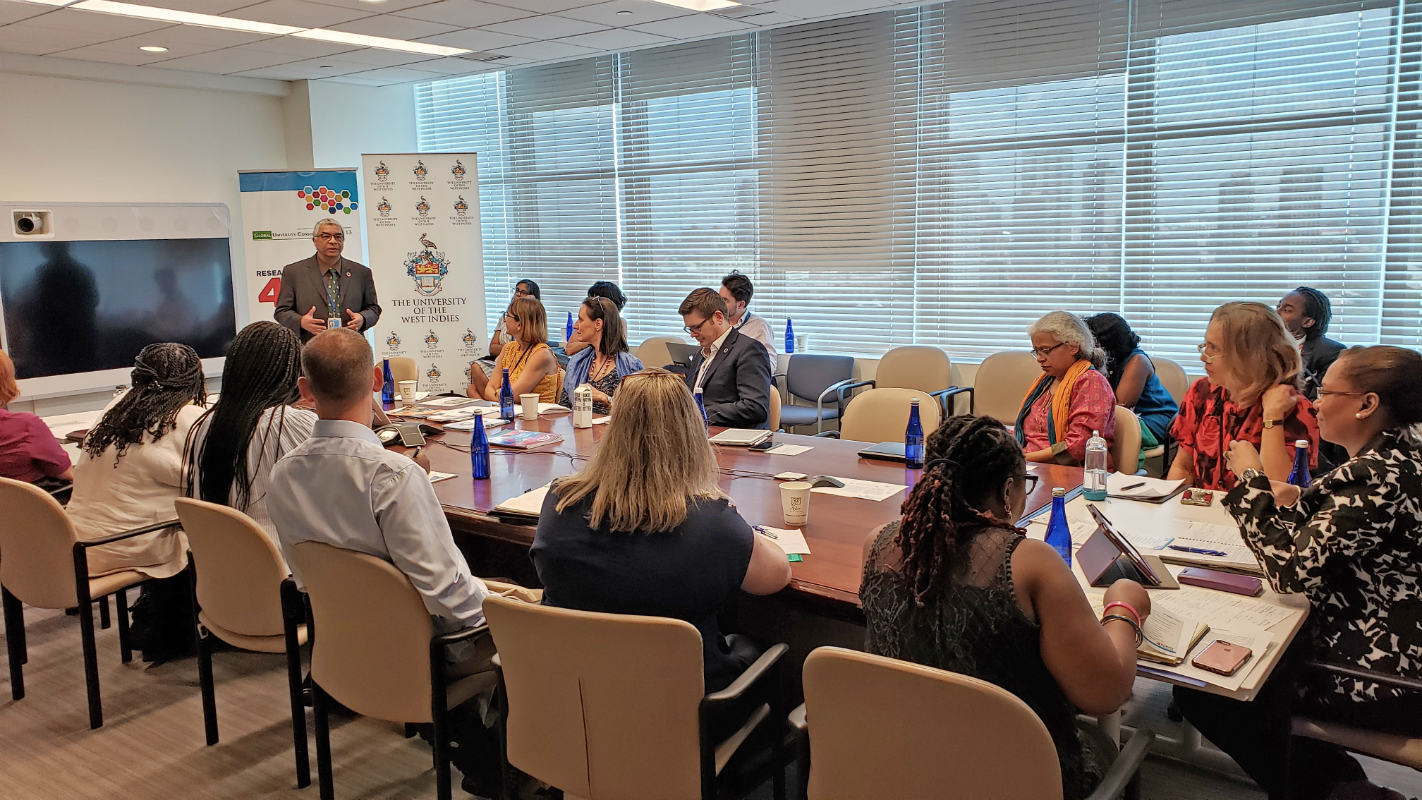Home / Featured Stories / Academics for climate change: The UWI leads the global university consortium
Academics for climate change: The UWI leads the global university consortium
Amplifying the voice of academia to advocate for climate change on the global stage is a logical move, as it merges knowledge, science, and humanitarian insight.
Scientific inquiry, data and evidence-informed policies are required to overcome social, economic, and environmental challenges, caused by climate change, and universities provide the necessary foundation of research. Higher education has been increasingly involved in sustainability debates at local and regional levels, as well as in global discussions and development processes.
It is within this framework, that The University of the West Indies (The UWI) was selected to lead the International Association of Universities’ (IAU) Global Cluster on Higher Education and Research for Sustainable Development (HESD), in 2019. The cluster comprises 16 universities, from 16 countries, from five UNESCO regions.
This designation recognised the significant contributions The UWI had already made through decades of research and advocacy on climate change and sustainable development, including climate modelling, environmental protection, marine ecosystems, disaster risk reduction and resilience and climate and eco-systems policy initiatives.

Coordinator of The UWI's Institute for Sustainable Development (ISD) and Director of the Centre for Environmental Management (CEM), Dr David Smith, making his presentations.
Boosting universities’ roles through clusters
In boosting universities’ contribution to development solutions, the IAU created a network of universities, worldwide, who would form clusters that focused on individual sustainable development goals crafted by the United Nations.
Clusters advocate for the key role that higher education institutions play in achieving the United Nations’ Agenda 2030. At the same time, they aim to increase and accelerate connections between universities of different natures and purpose in an innovative way.
The cluster serves as a resource and networking hub for universities to establish partnerships, access best practices, and scale up their activities. It also aims to be a global voice for higher education in sustainable development debates, informing international organizations and national governments about universities’ role in achieving the SDGs, and informing decision-making at local and global policy levels.
The IAU leads SDG 17 (Partnerships for the Goals), and is an affiliate body and higher education think tank for UNESCO.

SDG13 IN FOCUS: One of the speakers at the UWI and UN DESA symposium at the High-level Political Forum is climate researcher Kikki Kleiven from the University of Bergen. Here she is in action at the 2018 SDG Conference Bergen, an annual conference on sustainability issues for the university sector in Norway. Photo: Eivind Senneset for the University of Bergen. Photo credit: https://www.uib.no/en/sdgbergen/128491/research-innovation-4-climate-action
The UWI: Mobilising Higher Education and Research
For its cluster, the focus is climate action. The University of the West Indies (The UWI) was nominated to lead Sustainable Development Goal 13 (SDG-13), which focuses on what is a grave issue for much of the world.
The UWI’s Climate Change Research Cluster is led by Professors John Agard, Michael Taylor, and David Smith, and is coordinated by his advisor, Jeremy Collymore, Honorary Research Fellow at the Institute for Sustainable Development, and Resilience Consultant to the Office of the Vice-Chancellor for the global impact of their research and teaching.
Convening the collective knowledge, research power and innovative thrust of its cluster of 16 universities, The UWI has noted several achievements with its Global University Consortium on SDG-13.
Achievements: The UWI’s Work as a Global Leader
Within its first year, the Consortium has successfully advanced knowledge exchange, research collaborations, advocacy, South-South, and triangular cooperation.
Here are some key achievements:- The UWI has been effective in creating unique partnership dynamics between universities across different regions, from Ghana to USA, Aruba to South Africa, Canada to India, Norway to South Pacific, and Colombia to the UK.
- The cluster launched an online platform to facilitate collaboration, knowledge exchange and public awareness around SDG 13.
- It hosted symposia, international seminars, and a regional, Latin American and Caribbean workshop in collaboration with another consortium member, Universidad de los Andes.
- It hosted a symposium, “Research & Innovation 4 Climate Action”, as a side event at the United Nations High Level Political Forum (HLPF) 2019 at the UN Secretariat in New York. The higher education institutions showcased the crosscutting approach of the consortium to Sustainable Goals 4, 13 and 17. They also shared groundbreaking research and knowledge with a view to influencing new ways of thinking, policy debates and industry practice. Among the highlights were showcases of strides made in research in the fields of biomass energy, carbon sequestration, climate resilient design, and educational outreach and impact. It also highlighted the need to integrate the social sciences into the climate agenda.
Against this global backdrop, the SUNY-UWI Center for Leadership and Sustainable Development (CLSD) in collaboration with the Global University Consortium on SDG 13, followed with a symposium entitled “Global Partnerships for Climate Action” in September 2019 at the SUNY Global Center in New York.
As it moves forward, the Consortium continues to build a solid foundation for joint academic programmes, online courses, faculty exchange and student mobility to deepen learning and ensure the cross fertilization of ideas to tackle climate change.
What are SDGs 4, 13, and 17?
Here’s what these Sustainable Development Goals (SDG) mean?
- SDG 4 - Quality Education
- SDG 13 - Climate Action
- SDG 17 - Partnerships for the Goals.
Current GUC Members
Latin America and the Caribbean
The University of the West Indies (Convenor)
Universidad de los Andes (Colombia)
The University of Aruba (Aruba)
Africa
University of Ghana (Ghana)
University of Witwatersrand (South Africa)
Asia & the Pacific
TERI School of Advanced Studies (India)
The University of the South Pacific (South Pacific)
Europe
University of Bergen (Norway)
University of Bristol (UK)
North America
University of Waterloo (Canada)
State University of New York (USA)




